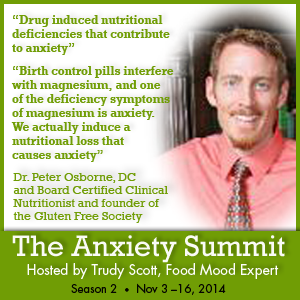Dr. Peter Osborne, DC and Board Certified Clinical Nutritionist was interviewed by host of the Anxiety Summit, Trudy Scott, Food Mood Expert and Nutritionist, author of The Antianxiety Food Solution.
Drug induced nutritional deficiencies that contribute to anxiety
- the victim-warrior concept for being empowered
- what is the meaning of drug-induced nutritional deficiencies
- drugs that contribute to anxiety through nutrition loss
- estrogen/ birth control pill and magnesium, folate, vitamin B6
- antibiotics: good bacteria, B vitamins esp biotin and vitamin B12, vitamin K
- antacids: protein malnourishment
- NSAIDs: iron, vitamin C, folate, strips mucosal layer
- prescription meds in drinking water
- how to test for these nutritional deficiencies
- nutritional deficiencies caused by gluten and the Gluten-Free Society
Here are a few snippets from our interview:
Birth control pills interfere with magnesium, and one of the deficiency symptoms of magnesium is anxiety. We actually induce a nutritional loss that causes anxiety.
I think for women, one of the most common problems is actually the estrogen pill, whether they’re being taken as birth control or whether they’re being taken to help with acne or taken to control cycles or hormones. Some doctors still prescribe birth control pills or estrogen pills for bone loss, so just depending on the reason the woman might be taking it, it’s just very clear – I want to be very clear that it’s estrogen that has this impact and this effect. And before I get into it, I will also say this, because a lot of doctors ask me, “Well, what about bioidentical hormones vs. synthetic hormones?” and there is no research that has studied whether there’s a difference between the two. So I’ll just be clear that what we’re referring to, the research that we’re referring to, largely has to do with prescriptive estrogen-based hormone that is not bioidentical, so I don’t think we have any research that would delineate the difference between the two.
One of the most common nutritional side effects of estrogen prescriptive pills is magnesium loss. Now, magnesium is an extremely important mineral. It plays a role in more than 300 chemical reactions in the human body. Of those 300 chemical reactions, several of them have to do with the proper utilization and the proper metabolism of estrogen. In essence, how do women excrete estrogen so that it doesn’t build up in their system and contribute to different forms of cancer? Well, this is done through a particular enzyme system that magnesium drives or runs, and this same enzyme system – it’s actually called COMT, catechol-O-methyltransferase, which is just a fancy way of talking about this enzyme. This enzyme is – again, it’s magnesium driven. This very same enzyme is extremely important for neurochemical production in the brain and neurochemical production in the gut.
Here is a link to Ross Pelton’s book, Drug-Induced Nutrient Depletion Handbook. This is a book I come back to refer to again and again. In the interview we got the titles a bit mixed up. Drug Induced Nutritional Deficiencies is the title of Daphne Roe’s book.
Here are some links to articles about prescription drugs being present in US drinking water:
- NBC article: 46 million in U.S. have drugs in drinking water
- An article by the non-profit Clean Water Action
- An interview and Q and A on NPR
Dr. Osborne founded Gluten Free Society in 2010 to help educate patients and physicians on the far reaching effects of gluten sensitivity. He is the author of Glutenology, a series of books designed to help educate the world about gluten. His gift is a video series called 7 Highly Effective Habits of the Gluten-Free Warrior
If you are not already registered for the Anxiety Summit you can get live access to the speakers of the day here www.theAnxietySummit.com
